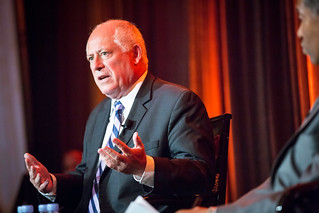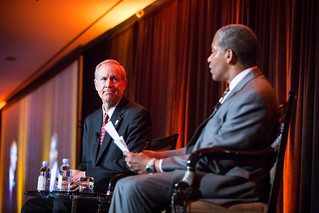The Chicago Metropolitan Agency for Planning's lauded GO TO 2040 regional plan prioritizes transportation investments based on performance measures, rather than through arbitrary formulas or aggressive politicking. This ensures that the hundreds of millions of federal dollars that CMAP handles are spent on projects selected on need and merit, rather than just because someone important likes the idea – which, sadly, has typically been the case in metropolitan Chicago. Yet the two major parties' candidates for Illinois governor showed only a passing familiarity with the concept when asked about it at a recent event.
Governor Pat Quinn and Bruce Rauner demonstrated their misunderstanding of performance measures at the Metropolitan Planning Council's annual luncheon last Thursday. This unfamiliarity was particularly surprising, since both campaigns had met with MPC to review the questions beforehand.
GO TO 2040, authored by CMAP and adopted by over 200 Chicagoland municipalities, establishes performance measures that evaluate major projects' potential to increase transit use, reduce driving, and eliminate harmful smoke and soot. Currently, however, most of the state's transportation funding for roads and bridges bypasses this system and is allocated by a formula: 45 percent of funds go to Chicagoland, even though this area has 65 percent of the state's population and 70 percent of economic activity.
Moderator Craig Dellimore of WBBM asked each candidate, "To get more 'bang for the buck,' do you support using performance measures to select Illinois' transportation investments – for instance, prioritizing new road or transit projects that measurably improve access to jobs, reduce air pollution and spark adjacent economic development?"
Even putting aside the candidates' usual attempts to steer every question towards their own talking points, both candidates' answers showed an incomplete understanding of what performance measures are.
Rauner answered pretty directly, saying he "emphatically, strongly supports performance evaluation when we're making these decisions," and that he'd want to work with MPC to come up with the best way to do that. He added that there should be cost-benefit analyses "of our spending and regulations."
He should already know that CMAP already does cost-benefit evaluations of each major project. MPC's question was less about evaluating projects, but instead comparing projects to each other – and only funding the ones which better achieve the region's goals.
Quinn has proudly subverted our region's infrastructure performance measures to advance his own political aims. He injudiciously got Metra and Pace to side with road expansion interests, and vote to include the Illiana Tollway into the GO TO 2040 plan. That act heightened the already stiff competition for scarce transportation funds, and CMAP's own staff said that Illiana was antithetical to the plan's goal of focusing on already-developed areas.

Quinn responded that he thinks performance measures are important -- but then grabbed the chance to tout one of his administration's accomplishments. A new highway bridge crossing the Mississippi River at St. Louis met "all performance requirements," and that local African Americans accounted for 24 percent of the project's workforce. I'm glad that Illinois built a bridge that meets engineering standards, and exceeded minority hiring requirements, but again, we should expect that new bridges should meet relevant safety standards and applicable laws. Those are baseline standards, not performance goals.
It's time for each campaign to take a much closer look at GO TO 2040's goals, which focus on building livable communities, with affordable and connected transportation opportunities, by reinvesting in the communities where most Illinoisans already live and work. Quinn's own performance in respecting the plan has been dismal, and so far Rauner has scarcely mentioned it.




